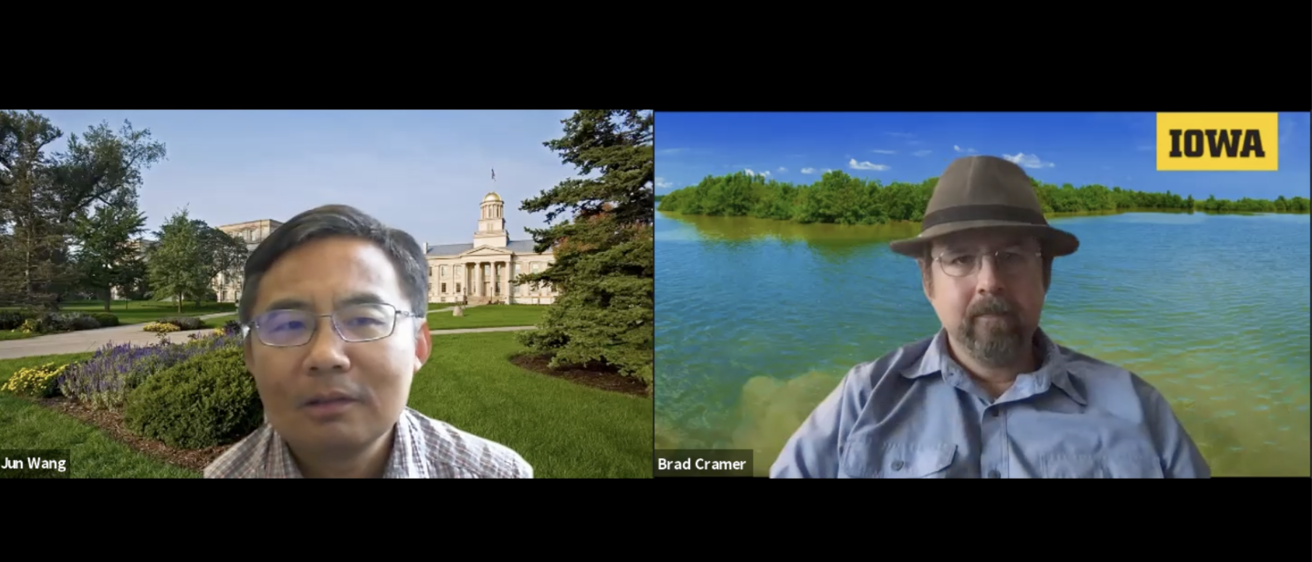The University of Iowa's Climate/Atmospheric Science & Engineering (CASE) Colloquium continued on Aug. 25, 2021, with featured speaker Bradley D. Cramer, UI associate professor of Earth and environmental sciences. The CASE Colloquium is presented by the Center for Global and Regional Environmental Research and the Iowa Technology Institute.
Topic: Nutrients, Teratology, and Extinction Events in the Geological Record and an introduction to the Ashton Prairie Living Laboratory
Watch the replay below.
ABSTRACT: Many of the most significant extinction events in Earth history coincide with extreme perturbations to the global carbon cycle, which are preserved in the rock record as changes in the carbon isotopic composition of the global oceans through time. These chemostratigraphic “excursions”, recorded in the carbon isotope record of both carbonates (δ13Ccarb) and organic matter (δ13Corg), provide powerful tools to unlock the history of changes in the ocean-atmosphere-biosphere system during major biogeochemical events in Earth’s past. Our research group at the University of Iowa has spent the past several years producing unparalleled continuous long-line records of δ13Ccarb and δ13Corg during a series of major Paleozoic biogeochemical events ranging in age from approximately 500Ma to 350Ma. These records, combined with additional geochemical proxies, have begun to demonstrate fine-scale, often asynchronous, behavior within the sedimentary records of carbonate and organic carbon and have begun to bring similarities and differences between Paleozoic biogeochemical events into focus. A common theme that has begun to be apparent is the role of marine eutrophication, anoxia/euxinia, extreme enrichment in heavy metals, and the presence of malformed teratological species all occurring at the onsets of these major biogeochemical events. Given the overwhelming nutrient loading of modern coastal systems by riverine discharge, and the subsequent deoxygenation of marine systems, these ancient episodes of global change may provide useful examples of natural environmental thresholds in the integrated Earth System. The Ashton Prairie Living Laboratory is a six-acre prairie restoration site on the grounds of the UI Ashton Cross Country Course. In 2020, more than 20 faculty and staff organized a project funded by CLAS to turn this space into a living laboratory for use by classrooms, students, and faculty across campus. A brief overview of current progress and future plans will be provided. The space is open to all students and faculty for research and teaching.
BIO: Brad Cramer is an Associate Professor in the Department of Earth and Environmental Sciences at the University of Iowa. He received his M.S. and Ph.D. in Geological Sciences from The Ohio State University before completing a National Science Foundation (NSF) Post-Doctoral Fellowship at the University of Kansas and Kansas Geological Survey. He joined the faculty at the University of Iowa in 2012 and received an NSF CAREER Award in 2015. He was the project leader of the UNESCO – International Geoscience Programme (IGCP) Project 591 that ran from 2011 to 2016. He is currently a Provost’s Faculty Fellow for Diversity, Equity, and Inclusion, and is the Director of the Iowa Micropaleontology Laboratory. Dr. Cramer is member of the U.S. National Committee for Geological Sciences within the Board of International Scientific Organizations at the U.S. National Academies of Science, Engineering, and Medicine; is the Chairman of the International Subcommission on Timescale Calibration within the International Union of Geological Sciences; and is the President of the Great Lakes Section of the Society for Sedimentary Geology. He works on integrated Earth-System Science and his research focus is on ancient biogeochemical interactions within the ocean-atmosphere-biosphere system during extinction events and intervals of global change.
Learn about the Colloquium: https://cgrer.uiowa.edu/new-seminar-series
Find past CASE presentations: https://iti.uiowa.edu/whats-happening/events/case-colloquium-speaker-series
